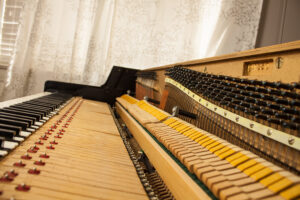When students fixate on how long they practice (“I practiced 30 minutes!”) instead of what they achieve, it often leads to frustration or wasted time. It’s much more effective to focus on constructive piano practice every time, using purposeful repetitions rather than counting the clock.
Why Constructive Repetition Beats Timed Practice
- Focus on correct repetitions instead of total duration. For example, playing a difficult phrase correctly three times is better than playing it wrong thirty times.
- Chunking pieces into small sections and mastering each section builds confidence and precision.
- Research on varied practice shows that alternating tasks—rather than repeating the same phrase endlessly—improves retention and adaptability (“varied practice” benefits in motor learning).
Sample Practice Strategy
- Break a new piece into short phrases or transitions.
- Practice each segment until the target number of correct repetitions is achieved (e.g. three in a row without error).
- Once segments are secure, play through the whole piece slowly to connect it.
- No stopwatch needed—just aim for clear, controlled progress.
Teachers at Lessons In Your Home encourage this model alongside student-driven goal-setting to build musical awareness naturally, rather than forcing mindless repetition (read more about intentional practice).
How Music Skills and the Brain Grow Together
- Studies from the University of Bath and NIH show that piano practice—even just a few weeks—boosts multisensory processing, memory performance, and mood (Bath study benefits).
- Training with goal‑oriented repetition is especially useful for young learners developing working memory and executive functioning (music training cognitive benefits).
FAQ – Smarter Practice Habits
Q: Should students count repetitions or just play until they feel better?
A: It’s best to set a modest goal like three accurate plays of a phrase. Focusing on quality builds muscle memory more reliably than quantity.
Q: Isn’t varied practice distracting for young children?
A: Actually, switching between segments or including rhythm and sight‑reading challenges keeps the brain engaged and memory stronger.
Q: How long before benefits become noticeable?
A: Within 4–6 weeks of focused practice, most students feel smoother transitions and better recall—even if total practice time stays modest.
